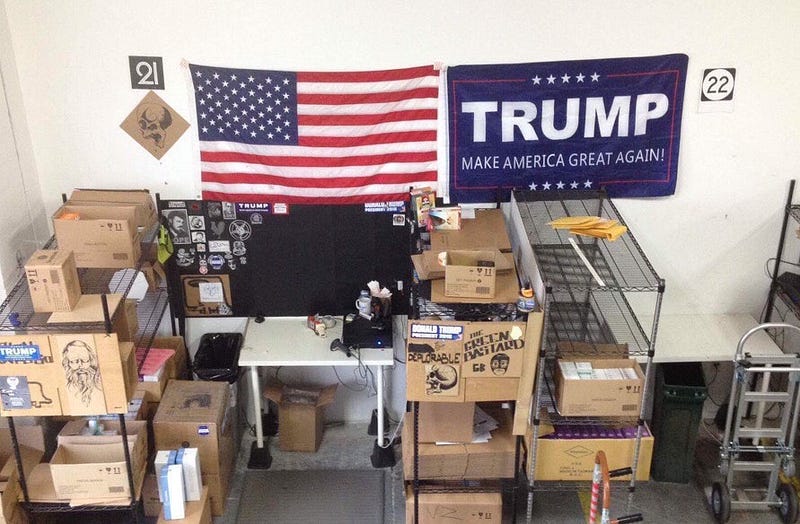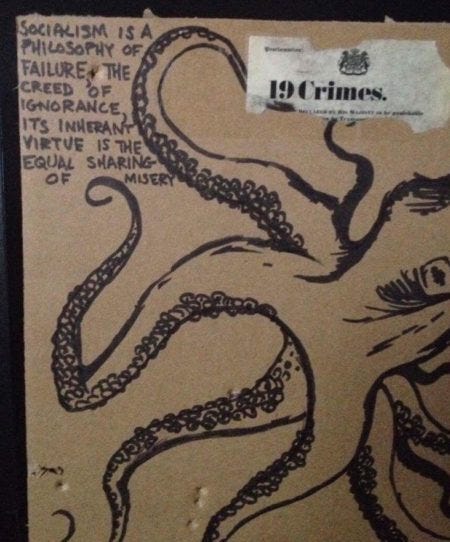
By Eoin Higgins
Incendiary Pepe the Frog memes, printed out and hung around the office. A Trump Make America Great Again flag covering a large portion of a workspace wall. An image of Bernie Sanders with the word “Cuck” printed over his chest.
These are some examples of the environment inside of home security firm SimpliSafe’s shipping warehouse in Charlestown. Photos provided to the Boston Institute for Nonprofit Journalism (BINJ) show a workspace rife with hard-right propaganda. And former workers at the facility say that their attempts to alert management to the problem went unanswered at best — and intentionally ignored at worst.
“It was an unbelievably toxic environment,” former SimpliSafe employee Drew Purvis said. “The memes and other things posted around the office were intended specifically to get a rise out of people who didn’t share those views, and it worked really well on me.”
SimpliSafe provides customers with a do-it-yourself security system that consumers can set up for themselves in their homes. The product is made in China and packaged at facilities like the one in Charlestown. The company was selected by the online consumer guide CNET for its Editor’s Pick for Best Home Security System in 2014.
Andrew Jeromski, who left the warehouse in March after working with the company at the facility for three years, told BINJ that the workspace was full of hostility to those with liberal views.
Two managers in particular, he said, were the aggressors. It’s an account confirmed by Purvis. Purvis, who worked with Jeromski at the Charlestown space, told BINJ that the two supervisors “were openly racist and extremely hostile to anyone who didn’t share their views.”
BINJ was able to confirm the identities of the managers but will not share that information publicly due to concerns for the safety of our sources.
“By itself, the Trump stuff isn’t enough to show a hostile work environment,” said Stefanie Scott Shah, a Texas-based lawyer specializing in employment law and litigation. “But in the context of the white nationalist memes, it’s clear.”
One of the supervisors has now been promoted, Jeromski said, to a higher management position at the company’s fulfillment facility in Braintree. That doesn’t bode well for anyone working under the supervisor who might have different opinions on politics — because the reaction is likely to be antagonistic.
“He just wanted to make people very angry,” Jeromski said.
It worked. And for June Politano, the harassment reached extreme levels — to the point that she says she felt unsafe. Politano, who worked at the Charlestown facility from January 2015 to March of last year, told BINJ that the constant use of white nationalist memes around the office disturbed her and made her feel unsafe in the office — so much so that she went to management to complain.
“I arrived to work early one day and saw that on my supervisor’s desk was a printout with 50-plus copies of the Pepe the frog meme holding a smoking gun that read ‘Goodnight Left Side,’” Politano said.
The next day, one of the printouts was taped outside of her supervisor’s work area. When Politano brought the racist iconography to the head manager’s attention, she said, he played dumb.
“In general, your employer can ask you to remove political signage from your work area (unless it’s somehow related to your job),” said Adam Bojak, a New York-based attorney who responded to an open solicitation for lawyers familiar with this issue. “If the signage is related to forming a union, that sort of political speech would be protected.”
Bojak told BINJ the enforcement of that right by employers isn’t exercised on a regular basis — especially not when the views expressed by workers reflect those of the employer. As far as any controversial opinions, he added, those would likely be frowned upon, if only because of the potential for interfering with efficiency.
In Politano’s case, she said further attempts to bring the right-wing propaganda to SimpliSafe’s attention only resulted in more harassment. That’s a theme that BINJ heard from each of the former facility employees. Attempts to find a solution with help from company superiors proved fruitless.
“The corporate end of the company just could not have cared less about what went on over there, and they took it as license to do whatever they wanted,” Purvis said.
All that happened, according to Purvis, was that the situation became more and more uncomfortable — the workplace was out of control.
“The more I tried to get a resolution from management the worse it got,” said Purvis.
That could be indicative of a deeper problem in the workplace, Scott Shah explained.
“It’s one thing if they didn’t know,” the Texas attorney said. “It’s very different if they knew and did nothing.”

SimpliSafe told BINJ through Boston public relations firm ML Strategies that the company takes action when workers have complaints. The statement, authored by ML Senior Vice President of Strategic Communications Nancy Sterling, did not address any of the specific complaints from the Charlestown warehouse.
“When an employee raises a concern, or if a particular situation needs to be addressed, the company responds in accordance with our policies to maintain a collaborative and tolerant workplace,” Sterling’s statement read.
BINJ reported in November on the struggle, being waged by SimpliSafe’s call center workers in the company’s downtown Boston offices, for a resolution to a number of issues ranging from bedbugs to racist abuse. Three of those workers — Lauren Galloway, Abraham Zamcheck, and Ryan Costello — formed a solidarity organization called United SimpliSafe Workers to address the problems at the call center. And their complaints sound similar to those of Purvis and Jeromski: a racially toxic work environment and a lack of support from management.
According to a United SimpliSafe spokesperson, supervisors at the call center are majority white and treat their subordinates of color with dismissive and abusive language. In one instance, a white supervisor allegedly said to a majority black and Latin team, “I’m like a slavemaster and you’re my slaves.” When this incident was related to the company’s human resources department, United SimpliSafe said, it was chalked up to a misunderstanding and no discipline was administered to the offending party.
“When we receive complaints, they are immediately investigated and, without going into details of personnel matters, SimpliSafe takes prompt and appropriate action,” said SimpliSafe spokesperson Melina Engel, referring to the complaints in the call center. “Employees have numerous mechanisms to report issues, including direct supervisors and managerial supervisors on the call center floor, as well as human resources and senior management all of whom are in the same building.”
One place where the company did take action in the call center was in the group chat for workers to troubleshoot and occasionally joke around. Once the election was in full swing, said Zamcheck, rules came down from management that people could no longer talk about Donald Trump in the chat.
“We were not allowed to put the Trump name in there,” Zamcheck said. “People would often make jokes and stuff.”
Many of the company’s advertisements run on right-wing radio, said Zamcheck, so SimpliSafe wanted to avoid any joking around at the then-candidate’s expense. SimpliSafe ads run on Rush Limbaugh, Howard Stern, Dave Ramsey, and the shows of other notable hard-right personalities and shock jocks.
“Their entire business model is built on encouraging and then profiting from the wave of fear and anxiety overwhelming the country,” Purvis said.

SimpliSafe did not respond to questions about the specifics of policies around the nature of political speech at the company. But at the Charlestown warehouse, it was clear that certain views weren’t going to be tolerated.
“Anyone who openly disagreed was a target,” Jeromski said. “If they found out you were opposed to Trump, you might find a Pepe on your desk.”
Politano told BINJ that she was so disgusted with the perpetuation of white nationalist agitprop in the workplace and the inability of management to do anything about the problem that she took matters into her own hands, tearing up printouts of Pepe and taking down Trump signs. She did it, Politano said, because she was aware of the message that was being sent. “I know what it means, and it was completely unacceptable,” Politano said.
There’s a difference between political speech and threatening iconography, according to Bojak. “The Pepe frog has obvious connotations and links to the alt-right/white supremacy groups,” he told BINJ, adding that while printing the image out might be interpreted as simply an attempt to get a rise out of people, the specific meaning of Pepe in the white nationalist movement could create a feeling of uncertainty and insecurity that rises above issues of free speech in the workplace.
“They are absolutely creating a workplace in which people from numerous marginalized groups would not feel welcome, or even safe,” Bojak explained. “The person supervising that employee should be taking action as soon as possible.”
In her statement on behalf of SimpliSafe, Sterling told BINJ that the company has employees from a number of backgrounds. “SimpliSafe has a diverse workforce who carry wide-ranging points of view on numerous topics, including politics,” Sterling said.
Wide-ranging is one thing, harassment is another. According to Jeromski, the conservative politics in the warehouse didn’t stop with posters and memes. “It wasn’t just signage,” he said. “It was the culture there.”
Jeromski described a workplace where people of color didn’t advance and the white managerial class maintained white hegemony in professional and social settings. Nonwhite workers wouldn’t receive recognition for their work, Jeromski said, and were frequently passed over for less experienced white workers. And nobody would talk to them.
The language used around the warehouse, said Jeromski, was racially explosive — though the slurs were kept to small groups.
“In private settings, I heard two or three people use that kind of language,” said Jeromski, who confirmed that the two managers at the warehouse were two of the people in question.
It doesn’t seem like those being antagonized at SimpliSafe shipping and fulfillment centers have much recourse. If, as the company said through its spokesperson, policies are continuing in place as they have in the past, then chances of potential positive resolutions are minimal.
“I complained all the time” about the behavior, Jeromski said. “Management made noise about doing something, but they did nothing.”
The same thing happened to Politano. Before leaving, she said she tried again to address the issues surrounding her supervisors’ work areas. And again, she said, nothing happened.
“I told our manager, ‘Hey, your employee [the one that had the Trump flag] has a bunch of offensive stuff up displaying at his desk and a Trump sticker facing the front window of the building,’” Politano said. “And again the manager played dumb.”
That could be ineptitude. But Purvis took a cynical view of the situation. According to the former employee, maybe the problem isn’t that racialized abuse is something that the company can’t handle, or ignores.
“Maybe it’s systemic throughout the company,” Purvis said.
This article was produced in collaboration with the Boston Institute for Nonprofit Journalism.
Originally published at digboston.com on December 20, 2017.

